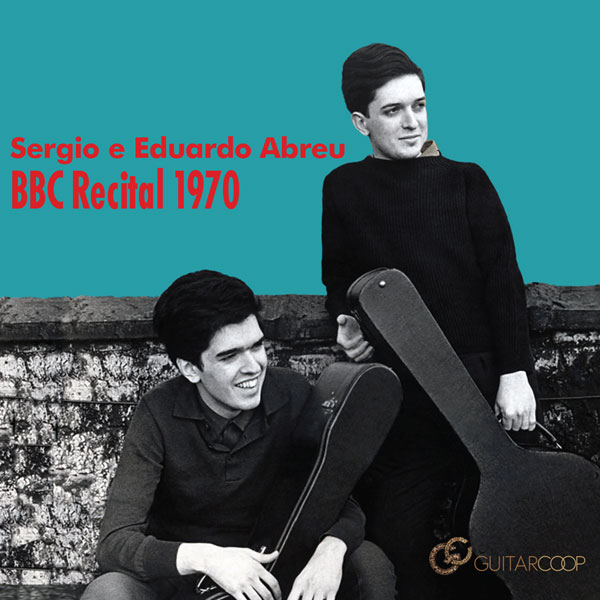
GuitarCoop Store
Sergio and Eduardo Abreu – BBC Recital 1970
CD available only in Brazil
Para comprar o CD físico no Brasil, entre pelo menu em português e compre em nossa loja.
Clique aqui
Sergio and Eduardo Abreu – BBC Recital 1970
Some artists have managed to build a wide audience through sheer power of communication, strong personality and charisma. Among them, there are those who also inspire awe – and some envy too – in their peers, due to their all-embracing command of the craft, perfect balance and infallibility. In their hands, each work is burnished until it acquires a singularity; each sound has an intention and a predicate, and the instruments seem to achieve unreal purity and translucence. We are talking of towering figures like Michelangeli, Heifetz or Zimerman. And the Abreu Brothers.
Their biography has been told many times but it is important to remember their international career was exceedingly short, a span of seven years between 1968 and 1975, the year Eduardo gave up playing in public. Sérgio continued as a soloist, but starting in 1978 he took interest in guitar building; he became a full-time luthier after an intended one-year sabbatical in 1981 he never returned from. In that short period they played in the most important chamber series in Europe, USA and Australia, and managed to record three LPs for CBS and Decca; Sergio would still make a solo recording in the late 1970’s.
The guitar duo combination had largely been looked at as a fortuitous meeting or an extension of the master-pupil relationship. Only in the 1950’s the Presti-Latoya Duo crystallized the idea of a guitar duo as a high-end chamber music experience, with a large and varied repertoire. Ida Presti died prematurely in 1967, thus creating a blank; the Abreu Brothers came to the fore just in time to fill in, notwithstanding their very different outlook.
They owed their musical upbringing to the Argentine teacher Adolfina (a.k.a.”Monina”) Távora, whose teaching methods mirrored the comprehensive training reserved, until then, to piano or violin prodigies. Aware of their unusual talent, she set high technical standards, studying the repertoire with an eye on perfection, free of deadlines; she encouraged them to develop their musicianship and to get to know the best musicians; she also persuaded them not to listen to other guitarists, lest they might feel the temptation to copy them, and to develop autonomy of musical thought through a careful study of symphonic and chamber music scores; she also took care of their careers, thus avoiding premature splurge. Perhaps she watered a plant that was already inclined to grow in that direction; it was not just training, it was the establishment of a musical culture. Right from their first concerts in England, it was clear they had been born mature. Unlike the Presti-Latoya, they included solos in their programmes. Their playing style was sober, aristocratic, level-headed, with clear dynamic plans and well-modulated tone quality, but under the glacial appearance the music-making had hot fuel; the technical assurance only had a parallel in another young prodigy, John Williams, but their voice was purer. When necessary, their guitars were “tamed”, and not even conscious effort could make the listener aware of the inherent imbalance of guitar fingering; but when the repertoire required, they could boldly explore musical colour.
When one hears their official and numerous informal recordings, one can immediately notice a gradual gain in musical maturity year after year. Details are integrated into the overall vision, and the minute control of tempo and phrasing reflects their analytical power in an increasing suppleness.
That is why it is important to hear this programme recorded in London in October 1970 for the BBC. They played the same programme on the 18th at the Queen Elizabeth Hall; they would return to the same venue on the 28th to perform Castelnuovo-Tedesco’s Concerto with the English Chamber Orchestra. On the 26th and 27th they recorded both Castelnuovo and Santorsola’s concertos with the same orchestra at the Abbey Road studios. The BBC recording must have been made around those dates.
BBC classical radio tends to preserve the here & now journalistic ethos of the institution. Their broadcast programming is largely based on live concerts and exclusive recordings made at their studios, where artists play the repertoire they are currently touring with. Their archives keep thousands of treasures – unique recordings of all major musicians who played in London in eight decades. Therefore the high quality of the recordings has no make-up; rather, they are made in a concert-like setting, even when there is no audience. There is no margin for technical retouch; one listens to a faithful portrait of a live performance.
Thus the impact of the Abreus’ immaculate beauty is even greater. They play a typical repertoire: Rameau, Scarlatti and Weiss transcriptions; Latin music is represented by Ponce’s Sonatina; the best of original guitar music comes with Castelnuovo-Tedesco and Burkhart’s modern, but not experimental, Toccata. In 1970 the historically informed performance movement was gathering momentum and many pianists and conductors restricted their baroque repertoire to revise their convictions; the Abreu brothers proposed a synthesis, where a limpid, long lined and rigorously rhythmic approach is combined with minute articulation and embellishments. Castelnuovo’s pieces also demonstrate this knack for reconciling contrasting approaches, where an objective way of dealing with form is married to virtuosity and white-heat.
Sergio believes much of the magic of their robust, expressive and crystal-clear tone quality, Apollinean if compared to the Dionysian Segovia and Julian Bream, is due to their symbiosis with the exceptional instruments which, at the time, belonged to their teacher. He played on a Hauser 1930 she had bought from Segovia in 1935; Eduardo played on a Santos Hernandez 1920 she had purchased from the maker’s widow in 1955. They stick to this combination until 1973, when the fear of damage in tour led to the decision of adopting a pair of Rubios. Reviews from the time attest to the thunder their arrival provoked in a guitar scene still largely dominated by Segovia and his pupils: here one could hear artists who extrapolated the aficionado circles and bring guitar artistry to a new platform. Their LPs remained in the catalogue for another decade, but the duo’s abrupt interruption led to a gradual oblivion; those who heard them live are now over 55. The present generation has adopted new references and frequently has no idea the technical and musical apparatus today taken for granted had reached a pinnacle as early as the 1960’s. This is a gap in our musical culture GuitarCoop is now addressing, with this first digital release of the Abreu Duo.
Fabio Zanon
Jean Philippe Rameau
1/6 – Six Pieces from the Book of 1726 14’25
Allemande – Le Rappel des Oiseaux – Rigaudon –
Musette en Rondeau – Le Lardon (Menuet) – Les Cyclopes
(arr. Sergio Abreu) – Duo
D. Scarlatti
7 – Toccata K 141 (arr. Sergio Abreu) – Duo 3’51
Sylvius Leopold Weiss
8 – Passacaglia in D major (WeissSW 18.6, London Manuscript) – Solo: Sergio Abreu 4’13
D. Scarlatti
9 – Sonata in G Major K 391 – Solo: Sergio Abreu 2’16
Manuel Ponce 10/12 – Sonatina Meridional
Campo – Copla – Fiesta – Solo: Eduardo Abreu 8’51
Castelnuovo-Tedesco
13/16 – “Les Guitares Bien Temperées” 9’37
Prelude and Fugue in E Flat Major Op. 199 No21
Prelude and Fugue in C sharp minor Op.199 No 7 – Duo
Franz Burkhart
17 – Toccata – Duo 4’06
Credits
Production: GuitarCoop
Recorded at: BBC Studios, Londres/London
Date: October, 1970
Edition: Sergio Abreu
Remastering: Ricardo Marui
Musical Production: Sergio Abreu
Design: Ricardo Dias
Cover Photo: Blade cut picture on cardboard, on a photograph by Karen Tweedy Holmes
Booklet photos: Sergio Abreu private archive
Desktop publishing / Web: Eduardo Sardinha
Booklet text:
Fabio Zanon
Guitars:
Hermann Hauser 1930
Sergio’s duets, Sergio’s and Eduardo’s solos
Santos Hernandez 1920
Eduardo’s duets Collection Sergio Abreu
Revision:
Janaina Rossi Moreira/Thiago Abdalla
Acknowledgements:
Vicente Paschoal
Basil Douglas (in memoriam)
Adolfina Raitzin de Távora “Dona Monina” (in memoriam)


 Português
Português






